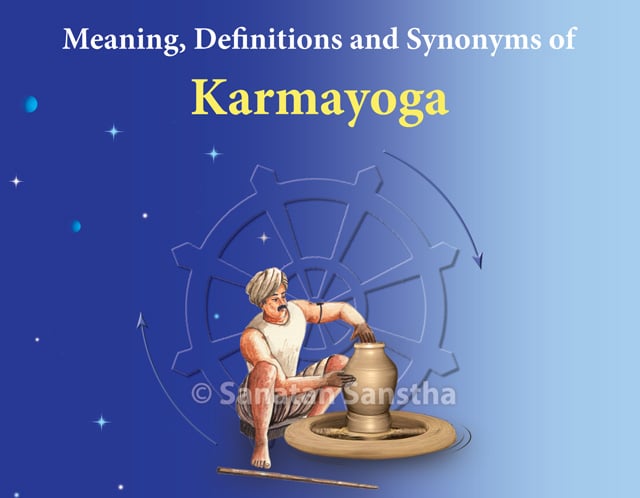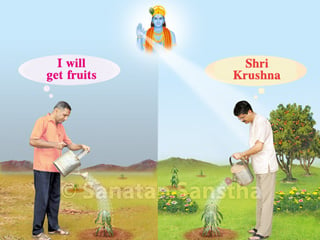
The word ‘Karma-yoga’ (Path of Action) conjures images of those giving alms to beggars, setting up educational institutions, and those engaged in social service. However, in most cases, since the activities are at an emotional level or for the sake of publicity, it does not constitute Karma-yoga in the real sense of the word. Performing that karma which will result in spiritual growth and, ultimately, God-realisation, denotes Karma-yoga. Even if the karma were to be worldly, performing it in a way such that no new sanskar (Subconscious impression) is created on the chitta (Subconscious mind) and thereby getting freed from the bondage of sanskars forever is the objective of Karma-yoga. Performing karma as expected by the Hindu Dharma and the scriptures, by sacrificing the attachment and the expectations of the fruit, is a supreme definition of Karma-yoga.
1. Karma-yoga meaning
A. Karma is the essence of human life. Knowing the importance and peculiarities of karma changes our attitude towards karma and we get exposed to a new dimension to perform it. When compared with Dnyanyoga (Path of Knowledge) and Bhaktiyoga (Path of Devotion), Karma-yoga is associated more with practical life. Karma-yoga meaning is described as follows.
कर्मण्येवाधिकारस्ते मा फलेषु कदाचन ।
– Shrimadbhagwadgeeta, Adhyaya 2, Shloka 47
Meaning : Your right is to perform karma only; but never to the fruit thereof.
In this blessing of Shrikrushṇa lies the essence of Karma-yoga.
Karma-yoga also teaches that even after God-realization, instead of renouncing karma, the activity of drawing g society towards sadhana (Spiritual practice) has to continue.
-
The word Karma-yoga is a combination of two words – karma and yoga. It means, seeking yoga (Union) through the medium of karma, that is, union of the jiva (Embodied soul) with Shiv (God Principle), which further means attaining Moksha (Final Liberation) through the medium of karma. The following Sanskrut shloka defines karma thus – तत्कर्म यत् न बंधाय । (सा विद्या या विमुक्तये ।).
). It means, ‘an activity which will not create any new impressions on the subconscious mind that have the potential to entrap into a bondage and which will not increase the account of merits and demerits or create a new bondage of any kind around the soul, is called karma in context of the word Karma-yoga. (That which bestows Moksha is known as ‘knowledge’). Consistently performing such karma is termed as karma-yoga. -
Not performing desire fulfilling karmas and performing nitya naimittik-karmas (Karmas such as ritualistic worship, vowed religious observances, etc.) Without any expectations of any fruit is Karma-yoga.
- योगः कर्मसु कौशलम् ।- Shrimadbhagwadgeeta, Adhyaya 2, Shloka 50
Meaning: Yoga is the skill in performing karma.
Implied meaning: Performing karma with an intellect devoid of any expectations, so as not to get affected by the fruit of karma. Only when there is no fruit of karma, an individual is liberated from bondage.
A. A Path that provides knowledge on why man performs karma, why karmas entrap in bondage, how to perform karmas without getting entrapped in bondage, which are the karmas that liberate a man from worldly bondage (that of Maya [The Great Illusion]), the importance of performing karma even after becoming Jivanmukta, etc., guides on how to abstain from performing wrong karma and on performing the right karma (so as to eventually attain Moksha [Final Liberation]) is termed as Karma-yoga.
B. When our tendencies gradually change from Tama-predominant to Raja-predominant and then get stabilised in Sattva, and further culminate in bhav (Spiritual emotion), our penance becomes special. This itself is called Karma-yoga.
2. Synonyms of Karma-yoga
A. Narayaniya Dharma
Shrivishnu is constantly engaged in some karma. Hence, Karma-yoga is also called the ‘Vaishnav Dharma’ or ‘Narayaniya Dharma’. (‘Narayan’ is one of the Names of Shrivishnu). – Mahabharat, Shantiparva, 339 – 66.67 and 340 – 44.45
B. Path of karmasanyas (Path of Smart)
The Path of Smart means Path advocated by the Smrutis. Traditionally however, it has come to be known as the Path of karmasanyas (Renunciation of karma).
C. Others
Other synonyms of Karma-yoga are Nishkam (Without expectation) Karma-yoga, Samatvayoga, Buddhiyoga, Bhagwadarthakarma, Tadarthakarma, Madarthakarma, Matkarma, etc.
3. Karma and Karma-yoga

Karma plainly means an action or a deed. It is not limited to just physical actions like eating, drinking, walking, laughing, etc., but also includes all karmas performed by the five sense organs, five motor organs, mind and intellect. Karma-yoga means to keep performing that karma which will result in our spiritual growth, and thereby we will eternally be associated with Brahman or God. In short, getting liberated from the cycles of birth and death through the medium of action is Karma-yoga.
Karma is kriya dependent, while Karma-yoga is independent of kriya. It means that Karma-yoga is achieved not with kriya, but with vivek. This means Karma-yoga is not the mere performance of karma.
Practising Karma-yoga is the elimination of the defects within us like anger, lust, greed, etc.
योगयुक्तो विशुद्धात्मा विजितात्मा जितेंद्रिय: |
सर्वभूतात्मभूतात्मा कुर्वन्नपि न लिप्यते || – Shrimadbhagwadgeeta, 5.7
Meaning : The one who performs karmas with devotion, who has conquered the five senses and the mind, is dear to all and all are dear to him. Even though he performs karmas continuously yet he does not get entangled in it, that is, he is free from the bondage of karmas.
A. Misconceptions about Karma-yoga due to lack of understanding the difference between karma and Karma-yoga
कर्मणा बध्यते जंतु: विद्यया तु प्रमुच्यते | – Mahabharat, Shantiparva, 233.7
Meaning : Karma keeps a man entrapped in bondage, while knowledge liberates him from that bondage.
B. If there is no nishkam-bhav in the practice of Karma-yoga, then it is merely karma and not Karma-yoga : In Karma-yoga, just nishkam-bhav is important. Anything other than nishkam-bhav is not Karma-yoga at all. It is merely karma. There is no Yoga involved here. Such karma has no connection with Yoga.
C. Karmas from Karma-yoga are not just any karma, they are those specified in the Vedas : In the present age, the Sanskrut phrase ‘योग: कर्मसु कौशलम् |’ is interpreted as ‘Expertise in performing a karma is Karma-yoga’. The modern people feel that, performing any karma expertly is by itself Karma-yoga. What then is the need to perform karma recommended by Vedas, they reason ? Be it a non-Vedic karma or a prohibited karma, having expertise suffices. That itself is Karma-yoga ! However, what does Shrikrushna say about it ? ‘कर्म ब्रह्मोद्भवं विद्धि’ meaning, karma originates from Brahman and Brahman means the Vedas. It simply means that karma advised by the Vedas is karma specified by Karma-yoga, and that precisely is Karma-yoga.
D. Performing karmas expertly that are not mentioned in the scriptures, is not the intent of the Karma-yoga : That which does not create bondage to karma is Yoga. Karma prescribed by the scriptures should be performed with such expertise that no kriyaman-karma is generated. Yoga is not meant for performing karma expertly that finds no mention in the scriptures. (Performing prohibited karmas like drinking, smoking, etc. in a stable state of mind is not Yoga). Yoga is meant for attaining Mukti (Liberation). A pleasant state of the antahkaran is the visible consequence of Yoga.
Reference : Sanatan Sanstha’s Holy text ‘Introduction to Karmayoga’


 Types of Karma
Types of Karma True and Fake Karmayogi
True and Fake Karmayogi Essence of karma to be performed according to Karma-yoga and How does Karma work ?
Essence of karma to be performed according to Karma-yoga and How does Karma work ? Special characteristics of Karma-yoga and Karma fruit
Special characteristics of Karma-yoga and Karma fruit